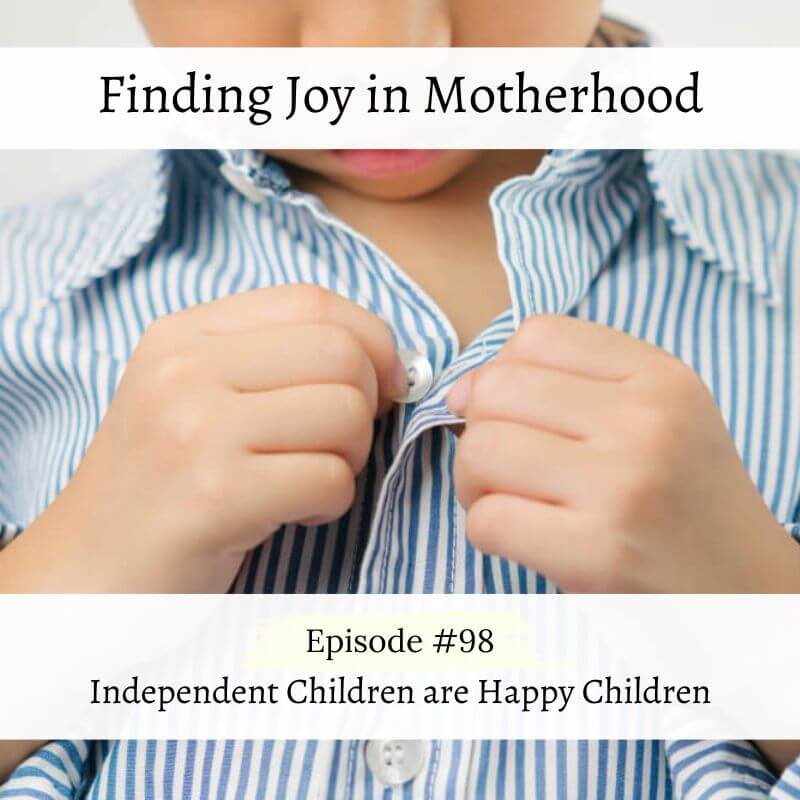Like What You Hear and Want More?
Sign up to join the waitlist for Reimagine Motherhood, my monthly coaching program. I give practical tools and help you make mindset shifts to create the marriage, motherhood, and home you’ve always wanted.
Notes From This Episode:
Background
- Go to www.findingjoyinmotherhood.com/home to download an age appropriate chore chart
- Independent = not requiring or relying on others for care or livelihood; not looking to others for our opinions or for guidance in our conduct.
- When children are independent, they don’t depend on anyone else for their happiness. They are content with who they are. They know their strengths and weaknesses, and they have the courage to be themselves.
- It is our primary job as parents to give our children the tools to become independent adults.
The Problem
- Many mothers believe being a good mom means doing everything for their children – they can’t do it by themselves or they’re not old enough
- If you want to hold onto your children and keep them dependent on you, you are in fact creating dependent, immature children and adults, and you’ll wonder why your teenagers act entitled or make irresponsible decisions
- If you think your child can’t do it on their own, your child will quickly learn that they can’t do it on their own – you don’t even need to say anything. They pick up what you think and make it their own belief about themselves.
- The story they are sold about themselves (even in this small amount of time) is the story they believe for the rest of their life
- It’s the story that stops them from being brave and trying new things.
Independence is Not Freedom
- Freedom is eliminating restrictions and always comes with a balance of responsibility.
- We nurture independence so that our children can be entrusted with freedom.
- The virtues they develop in practicing independent behavior allows them to develop a sense of responsibility, and responsibility means being able to answer for one’s conduct and obligations.
- Giving our children the tools to become independent sets them up to come responsible.
- Don’t mistake lapse parenting or permissive parenting for authentic teaching of the skills of independence. Independence is taught, it is not indulged.
Areas to Teach Independence
- Self-Care
- Teach them how to brush their teeth or dress themselves and then gradually give them the responsibility for doing it themselves.
- Taking care of their rooms
- Make the bed first thing.
- Pick up their rooms.
- Assign daily and weekly chores
- Please reference the chore chart found at www.findingjoyinmotherhood.com/home.
- Let your children play alone and create their own play.
- You do not have to entertain them.
- Give them some toys or give them the tools and they will learn to play on their own.
- Let them make their own meals
- Teach them to introduce themselves to others and say hello to other children.
- Help them to be independent in their schoolwork, having clear criteria about how much help you will give.
- Encourage learning a musical instrument.
- Music helps them learn discipline and counting and rhythm.
- Re-examine your child’s tech usage.
- The tech is the babysitter that creates babies who need a babysitter.
Final Thoughts
- Think about the best teacher you ever had – they were likely someone who had clearly communicated criteria for you, who did not indulge your selfishness or immature behavior, and who encouraged you and praised you.
- That’s the kind of teacher, the kind of mom, you should aspire to be.
- When we teach our children to become independent, we teach them the virtues of industriousness, orderliness, responsibility, moderation, justice, perseverance, sociability, and humility.
- We’re nurturing their self-esteem because children who can do for themselves believe and trust themselves.
- They will develop confidence in who they are and satisfaction with their true self and their own self-worth.
- We create happy, confident, brave, calm children who are problem solvers, not children who say “I can’t”.

